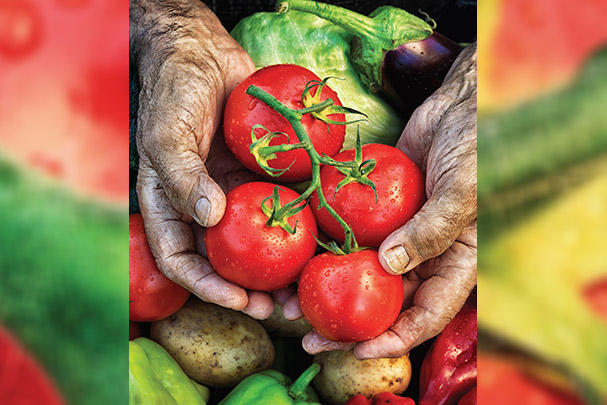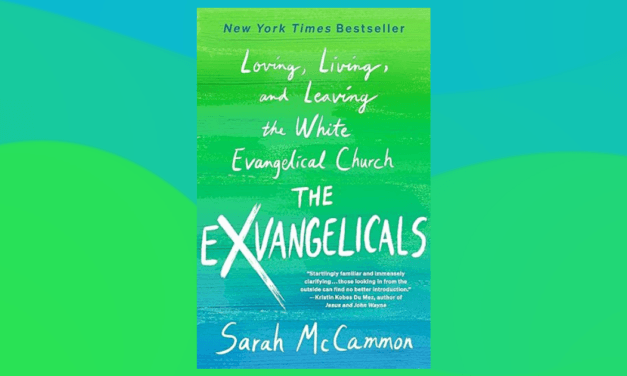This article first appeared in the CHRISTIAN RESEARCH JOURNAL, volume 39, number 03 (2016). The full text of this article in PDF format can be obtained by clicking here. For further information or to subscribe to the CHRISTIAN RESEARCH JOURNAL go to: http://www.equip.org/christian-research-journal/
America has an eating problem. The problem has little to do with expanding waistlines, gluten content, or fad dieting. These are only symptoms. The real problem is theological. The real problem is that we are no longer connected to the earth in the way God intended us to be.
When Christians talk about food nowadays, it seems the conversation usually revolves around our duty to feed the poor or a debate about a biblical view of vegetarianism. These are good points, but not the main point. From the tending of the garden of Eden, to the promise of the land to the Israelites, to the wedding supper of the Lamb (Rev. 19), the human connection to the soil, flora, and fauna of the creation has been an intrinsic part of our relationship with God.1 For that reason, thinking about food should include the realization that eating requires death, sacrifice, and patience, and that it serves as the centerpiece of our communion and celebration with the God who sustains us and who became flesh Himself—a God who ate with us.
SECULAR SOIL
When God called the Israelites to a land “flowing with milk and honey,” His people did not set off in hopes of inheriting a wide expanse of dirt. The promise was for a place where they could thrive as a nation both spiritually and physically. Its importance traced all the way back to the original man, Adam, who owed his very name to adamah, the fertile soil from which he was formed and on which his life depended. Adam was commanded by God to “till and keep” (avad and shamar) the garden (Gen. 2:15), Hebrew words that connote service and the preservation of that which is honorable and valuable. As Ellen Davis of Duke Divinity School has put it, “There are divinely established rules and constraints attached to our use of the soil, and it has always been so.”2
Garden soil requires cultivation and therefore a dedicated caretaker. “Soil is not dirt,” says Fred Bahnson. “It is a living organism, or rather a collection of organisms, and it must be fed. Soil both craves life and wants to produce more life.”3 The reverence with which Adam nurtured the garden led him to a deep connection with God through the earth itself, and reveals a fascinating irony about how detached we have become from the way God meant us to see His original gift of the land.
The Israelites’ devotion to God set them apart as a cult distinct from the surrounding nations. The related idea of culture as something uniquely dedicated to a common cause derives from the Latin term cultus, which implies a religious devotion parallel to what Adam was meant to practice in his garden. Even within the last few centuries, a “cultured” person was defined as an agrarian person—someone who possessed both the land and the skills necessary to draw life from it. But today we have plowed this notion upside down. “To be cultured now,” says Norman Wirzba, “means you would never have dirt under your fingernails because you would never be touching the land.”4
It follows that, having uprooted the very notion of culture from its footing in the earth, we have lost a godly connection to the food that arises from the soil. We have secularized our most basic human need.
SACRIFICE AND CELEBRATION
Recently, an acquaintance shared a traumatic childhood memory about a day when her father called her out to their backyard shed to help him skin a deer he had just taken on the first day of hunting season. The deer hung from the rafters of the shed. It was ready to be dressed, but first it had to be skinned. “Help me break its legs,” her father told her, “it makes the skinning easier.” Forty years later, she still retched at the recollection.
The girl had always loved the venison her father provided, but she had never imagined the process that brought that venison to her table. Her realization elucidates Wendell Berry’s dictum that one of the great superstitions of our consumer age is “the idea that money brings forth food.”5 Our culture seems strangely oblivious to the reality that if we are to eat, something must die. “Eating is the daily reminder of creaturely mortality. We eat to live….But to eat we must also kill, realizing that without the deaths of others—microbes, insects, plants, animals—we can have no food. ‘The whole of nature,’ says William Ralph Inge, ‘is a conjugation of the verb to eat.’”6
This fact has become invisible to us in an age of mass food production, high-tech farming, and grocery “superstores.” Akin to our misconception that light appears because we flip a switch, we remain ignorant of the extensive infrastructure that must exist behind the wall. And behind the wall of food production lays a self-perpetuating system of soil depletion and a vast industrial network in which animals live under harsh conditions, even if we ensure that they die humanely.
Today we view food as a commodity. This is a far cry from the original direct and nurturing connection God’s people had with the food they consumed. They recognized that their lives depended on it, offered their best—their “first fruits”—in return for it, and participated in a sacrificial system instituted by God as a way to recognize their dependence on the land and on Him. To them, there was no such thing as “cheap food.” Food was an inexpressible gift from God. It is a good thing that we have developed the most efficient food-producing system the world has ever known. But in doing so, we have stopped associating food with its creative and sustaining Source. As God-followers, our methods of food production should be more than efficient; they should be compassionate toward our fellow creatures and respectful of our responsibility to be stewards of the world God has entrusted to our care. As eaters, we should be more aware of our duty to recognize food as a gift.
IMPATIENCE AND IMBALANCE
Because only a tiny fraction of us actually have any contact with the land, we also have lost any sense of the patient caretaking required to produce our food. The reality is that we give little thought to food beyond how quickly we can obtain and consume it. Most of us eat food we have never seen growing or living in its natural habitat. Indeed, the food we consume usually originates on specialized farms thousands of miles away from us. Where eating used to be a central feature of life and community, modern food production has turned us into detached consumers. It also has put us at risk.
The same practices that allow us to produce food efficiently and in massive quantities—genetic modification and single-crop farming—also homogenize plant and animal species, short-circuit natural soil processes, and require fertilizers to rejuvenate soil devoid of natural and necessary life-giving microbes. But fertilizer runoff threatens aquatic life and groundwater, and while single crop industrial farming is highly efficient, it has resulted in a 75 percent reduction in the genetic diversity of our agricultural crops and seed stock over the last century.7
Likewise, the genetic modification of livestock, poultry, and fish accelerates their growth but portends unknown long-term consequences about their stability and vulnerability to disease. The application of herbicides and pesticides protects crops, but both crops and pests then become even more resistant to their application. The result is a toxic arms race that can introduce “genetic pollutants” into our natural habitats, upset fine-tuned ecological balances, and threaten the resilience of food chains over time.8
Beyond the ill effects of each of these practices on farming itself, the food produced by them is less nutritious and tasty than its natural forerunners. We compensate for these deficiencies by the widespread use of artificial supplements to enhance both. In the end, “the commodification of food has led to the paradoxical result that consumers now need protection from the food industry if they are to be healthy.”9
There are economic and practical reasons why it may be unrealistic to expect that our disconnectedness from the land or the commodification of the food we consume will change anytime soon. But there are also movements afoot that aim to alter the models of food production most of us have come to accept. We can impact the paradigm by the simple move to support local farmers who use natural, land-conscious agricultural practices to cultivate more healthy plants and animals. Volunteer cooperatives such as “Slow Food USA” and “Local Harvest”10 hope to inspire a renewed sense of appreciation for food and farming methods that garner the support of local communities with a vested interest in the food they eat. Wirzba believes these kinds of ideas “merit theological consideration because they give expression to God’s desire that people share in His delight in creation.”11
THOUGHTFUL EATING
Norman Wirzba’s exhortation to consider a “theology of eating” should strike a chord with thoughtful Christians who take seriously their obligations to be both good stewards of the creation and grateful eaters. We don’t need to wait for a farming “revolution” to become more mindful—and thankful—about the centrality of food to our existence. This is not to vilify the creative genius that has allowed us to feed the Third World at unprecedented levels; it is simply an observation about the mindset with which we approach our own eating practices.
A “theology of eating” involves deep and abiding gratitude and thoughtfulness toward the disciplines of fasting and feasting. While it is popular to engage in the former, we seem to have lost contact with a biblical view of the latter. Feasting and fasting are complementary, concrete ways to engage in a self-offering life. Fasting restrains our personal desires. Feasting celebrates God’s provision and our common life in community with others. It is not the opposite of fasting; gluttony is. Feasting is meant to focus our attention on the generosity of God and away from our proclivity for self-absorbed consumption.12 It reminds us that we are mere creatures who owe our existence to a gracious and loving Creator.
Whenever people come to the table they demonstrate with the unmistakable evidence of their stomachs that they are not self-subsisting gods. They are finite and mortal creatures dependent on God’s many good gifts: sunlight, photosynthesis, decomposition, soil fertility, water, bees and butterflies, chickens, sheep, cows, gardeners, farmers, cooks, strangers, and friends….Eating [should] remind us that we participate in a grace-saturated world, a blessed creation worthy of attention, care, and celebration.13
FUTURE FEASTS
The Israelites’ cult of sacrifice and worship included many feasts that served as ongoing ways to acknowledge God’s providence and provision. Eating was so central to the God-centered ancient world that Scripture mentions words related to eating over a thousand times. Yet, somehow, contemporary First-world Christians have not just minimized the reverent view of eating that existed throughout church history; they have lost it altogether. Vanishing right along with it was the clear and complementary biblical teaching that our resurrection in the new heaven and new earth will in some way be physical. We unwittingly have adopted what amounts to a Gnostic view that cannot even countenance the idea of eating in the eternal afterlife. Correcting this theological misunderstanding can affect the way we think about food in the here and now.
At the Last Supper, Jesus invited His followers to share bread and wine with Him as a way of memorializing His coming victory over sin and death. He didn’t invent the idea of a commemorative meal; He transformed it into a way for His people to commune with Him until He returns again. Likewise, as redeemed corporeal/spiritual beings in the new creation, we will feast with our Maker in some form that we cannot yet imagine.14 In the meantime, consistency compels us to acknowledge our current “creatureliness” by the continued practices of worshipful fasting and feasting with our families, friends, and neighbors, not just during a time of communion on Sunday mornings but every time we consume our daily bread.
Bob Perry, MA (Christian apologetics, Biola University), is a speaker with the Life Training Institute. He blogs about Christian worldview issues at true-horizon.blogspot.com.
NOTES
- This is a summary of the introduction to Ken Myers’s interview with Norman Wirzba on Mars Hill Audio Journal, vol. 113, available at: https://marshillaudio.org/catalog/volume-113.
- Ellen F. Davis, Getting Involved with God: Rediscovering the Old Testament (New York: Rowman and Littlefield, 2001), 193–94.
- Fred Bahnson, Soil and Sacrament (New York: Simon and Schuster, 2013), 3.
- Myers interview.
- Wendell Berry, “In Distrust of Movements,” Citizenship Papers (Washington, D.C.: Shoemaker and Hoard, 2003)Ibid., 48.
- Norman Wirzba, Food and Faith (New York: Cambridge University Press, 2011), 110.
- Ibid., 84–86.
- Ibid., 88.
- Ibid., 104.
- Local chapters available at www.slowfoodusa.org and www.localharvest.org.
- Wirzba, Food and Faith, 187. Some leaders of the so-called “slow food movement” face criticism for their associations with radical leftist causes and methods. But the “genetic fallacy” does not allow us to dismiss their ideas on that basis alone.
- Wirzba, Food and Faith, 137–39.
- Ibid., 2.
- Randy Alcorn, Heaven (Carol Stream, IL: Tyndale House Publishers, 2004), 301–9.









